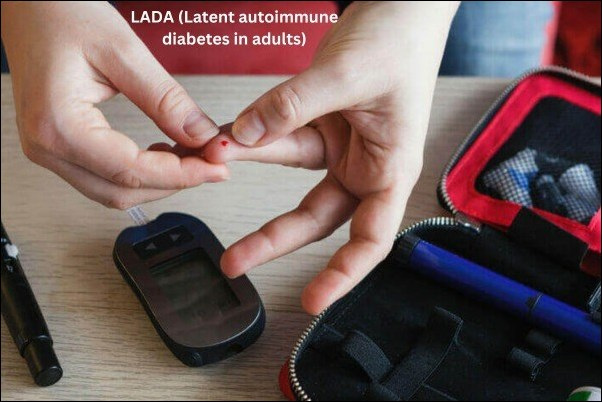LADA (Latent Autoimmune Diabetes in Adults) Treatment in Ayurveda
Abstract
Lada (Latent autoimmune diabetes in adults) is autoimmune diabetes which begins in adulthood and is similar to Type 1 diabetes and Type 2 Diabetes. Diabetes is an endocrine disease which is characterized by high levels of blood sugar. It is mainly due to when the pancreas does not produce enough insulin. An Autoimmune Disease is a condition which arises due to an abnormal immune response to the various functioning parts of the body. Glucose (sugar) mainly comes from Carbohydrates and provides energy to the body parts, this glucose reaches the bloodstream and needs help to reach the final destination but when the pancreas does not make enough insulin and gets builds up in the bloodstream it causes high blood sugar level (hyperglycemia). There are many types of Diabetes such as Type 1 diabetes, Type 2 diabetes, Gestational diabetes and Lada (Latent Autoimmune diabetes in adults) which is commonly seen at the age of 30, Neonatal diabetes, and Brittle Diabetes. In this article, we are going to discuss its causes, symptoms and its ayurvedic aspect in detail.

Introduction
Diabetes Mellitus (DM) is a wide spectrum of diseases which ranges from insulinopenic type 1 diabetes to Insulin resistant type 2 diabetes. It is a slow-progressing form of Autoimmune diabetes, it is mainly characterized by selective destruction of the insulin-secreting Beta cells during inflammatory reactions which are around the Pancreatic islets of Langerhans. Cytokines such as Interleukin 1 are released by activated immune cells and inhibit the secretion of insulin from beta cells and cause destruction. The World Health Organization for LADA is slowly evolving Immune-related diabetes. The concept of LADA was first introduced in 1993, which is a hybrid form of Type 1 and Type 2 diabetes. The autoimmune process tends to be milder and the progression of beta cell failure slows down in patients of LADA, there is a higher level of C-Peptide.
There are 3 criteria for the diagnosis of LADA (a disease of adults) by IDS (Immunology for Diabetes Society).
- Age greater than 35 years
- Positive Autoantibodies to Islets Beta cells
- After the initial diagnosis, there is insulin dependence for at least 6 months.
- Most of the patients are LADA positive for a single autoantibody and GADA (Glutamic acid decarboxylase antibody) is predominant.
Facts
- The patient of LADA has more production of insulin than type 1 diabetes patients which shows there is the destruction of beta cells which plays an important role in the pathogenesis.
- Low LADA shows less autoimmune activity which shows a low level of GADA, which tends to be more insulin resistant.
Causes of LADA (Latent Autoimmune Diabetes in Adults)
- It is caused due to the immune system which destroys the Insulin which produces beta cells in the pancreas.
- LADA (Latent autoimmune diabetes in adults) is known as prolonged diabetes, which is known as the “Honeymoon phase” where there are residual beta cells which function and they can achieve normal and near-normal blood sugar levels.
Signs and Symptoms
- Foggy brain
- Difficulty in concentration
- Dry and itchy skin
- Constant feeling of hunger
- Lethargic
- Excessive thirst
- Frequent urination
- Tingling sensation in feet, hands
- Bruises and various cuts heal slowly.
Diagnostic Tests
- Glutamic acid decarboxylase (GAD)
- Islet cell antibodies (ICAs)
- Haemoglobin A1 test
- Fasting plasma glucose test
- Oral Glucose tolerance test
- Ketone Test
- Random plasma glucose test
Treatment
- Daily insulin therapy
- Blood sugar monitoring
- Antidiabetic drugs such as Metformin which slows down the destruction of pancreatic cells
Complications
- Kidney Damage
- Nerve damage which causes loss of sensations
- Various disorders of eyes and vision
- Higher cholesterol level
- Diabetic Ketoacidosis (DKA)
Risk Factors
- Obesity
- Low birth weight
- Low physical activity
Ayurvedic Aspect
Prameha is a set of complex clinical disorders which is mainly characterized by frequent urination and turbidity. The nature of the turbidity depends upon the variation in the body doshas. There are 20 subtypes of Prameha with the interaction of 3 doshas and 10 dushyas and basically, it is Kapha predominance. The word Prameha is derived from the root “Mih Sechane ” which means Watering. Prameha is Kaphja predominant which gets aggravated and affect the various srotas channel such as Medas (fat), Mamsa (flesh) and Udaka (lymphatic channels) when there is abnormal digestion, it causes the aggravated doshas moves towards the urinary system and causes Prameha.
Etiological Factors
- Addiction of sleeping
- Excessive use of curds and meat juice.
- New grains and drinks
- Newly-made products of Gur
Purvaroopa (Premonitory Symptoms)
- Excessive sweating with a foul smell
- Sedentary lifestyle
- Obesity
- Excessive mucosal discharge
- The rapid growth of hair
- Thirst
- Sweetness of mouth
- Burning sensation in the hand and feet
- Swarming of ants in the urine
Classification of Prameha
Etiological Classifications (Sushrut Samhita)
Sahaja/ Jatah Prameha
Sahaja and Jatah Pramehi correlates with Type 1 diabetes.
- Family history
- Early onset
- Prone to complications
Prameha of Hereditary Origin is classified under Kulaja Vikara, which arises due to Bija-Doshas which is incurable in nature. It is mainly due to a Defect in Beeja (sperm and ovum).
Apathyanimittaja Prameha
It correlates with Type 2 diabetes
- Overnutrition
- Sedentary habits
- Obese
Clinico-Pathological Classifications
Kaphaja Prameha
10 (Early diabetes)
- Overweight with mild hyperglycemia
- Polyuria/Glycosuria
Pitta Prameha
6 (Acute Diabetes)
- Loss of weight
- Urinary Tract Infection
- Hyperglycemia with Glycosuria
Vataja Prameha
4 (Chronic Diabetes)
- Cachexia
- Neuropathy
- Retinopathy
- Cardio-Respiratory Complications
- Gangrene
On the Basis of Sahaja (Hereditary) Causes
Sahaja Means to Matapittabheejadushakruit (chromosomal defect from parents). Acharya Sushruta described 7 types and these 7 types are further divided into 2 types-
Adibalapravrutta Vyadhi
They are of two types Matruja (maternal) and Pittruja (paternal) which is due to the Manifestation of Shukra and Shonita. In this abnormality, if Shukra is defective the pittruja organ gets vitiated, the same is with Shonita, if Shonita gets vitiated the Matruja organ in Garbha gets hampered. In diabetes, it passes from generation to generation and passes to offspring.
Janmabalapravrutta Vyadhi
This is due to changes in diet and some behavioural changes and due to the mental state of the mother.
They are of two types
Rasakruta Vyadhi
It is due to Rutu, Kshetra and ambu, beeja. Ambu stands for the Ahara Rasa of Mother, so some vitiation in Ambu reflects on Garbha.
Dauhridapacharkruta
Sadhya-Asadhya
Sadhya (manageable)
- Apathyanimittaja Prameha (non-insulin-dependent diabetes mellitus)
- Kaphaja Prameha (early diabetes)
- Sthula Prameha (Obese Diabetes)
Yapya (Palliative)
Pittaja Prameha (Acute Diabetes)
Asadhya
- Sahaja Prameha (Insulin dependent Diabetes mellitus)
- Vataja Prameha (chronic Diabetes)
Herbs Useful in LADA (Latent Autoimmune Diabetes in Adults)
Gurmar
Gurmar (Gymnema Sylvestre) is helpful in subsiding Kapha and Pitta doshas. It is helpful in maintaining the health of the heart which regulates the blood sugar level. Eliminates the accumulated mucus from the respiratory tract. Has anti-inflammatory properties which is effective in managing type 2 diabetes and prevents the pancreatic cells which are caused by free radicals and increase the secretion of insulin which lower the insulin level.
Saptarangi
Saptarangi (Salacia chinensis) is helpful in lowering the blood sugar level and insulin in the body. Useful in liver disorders which corrects the metabolism of the liver and is useful in arthritis and inflammation of the joints. Helpful in reducing excessive sweat which emulsifies the fatty liver condition. Act as a pancreatic stimulant and insulin sensitizer.
Jamun
Jamun (Syzygium cumini) balances Pitta and Kapha doshas. It is a miraculous herb for diabetes, which maintains proper blood sugar levels in the body. Helpful in the digestive system and has aphrodisiac properties. Strengthen the teeth and gums, which act as a general tonic to treat weakness and anaemia and improve sexual weakness. Rich in Vitamin C and Vitamin A which improves the health of the eye and skin.
Bilva
Bilva (Aegle marmelos) has hypoglycemic action which is useful in controlling diabetes as it helps the pancreas to produce more amount of insulin which controls diabetes. Has laxative property which treats constipation and controls the functions of the heart and cardiac system of the body. Cures various skin diseases and gastrointestinal disorders.
Herbal Remedies for LADA (Latent Autoimmune Diabetes in Adults) by Planet Ayurveda
Planet Ayurveda is a GMP- Certified Ayurvedic clinic which formulates various remedies for the prevention of multiple health issues and diseases of the diseased person. All the formulations which are made are free from any kind of preservatives, additives and resins. These formulations are pure and 100% natural and are prepared under the supervision of M.D ayurveda practitioners and cause no side effects. For the purpose of LADA (Latent autoimmune diabetes in adults) Planet Ayurveda provides many herbal remedies which we will discuss further in the article in detail.
Products List
- Dia-Beta Plus
- Karela Capsules
- Madhumehantak Churna
- Fenugreek Capsules
Products Description
1. Dia-Beta Plus
Dia- Beta Plus are polyherbal Capsules which is formulated by planet ayurveda using Gurmar (Gymnema Sylvestre), Saptrangi (Salacia oblonga), Tulsi (Ocimum tenuiflorum) and many more. It is helpful in preventing the fluctuation of blood sugar levels in the body. Useful in dealing with fatigue and rejuvenates the overall health of the body. Maintains healthy glucose levels in the body.
Dosage- 2 capsules twice daily before meals with warm water.
2. Karela Capsules
Karela Capsule is a single herbal capsule which is formulated by planet ayurveda using a Standardized extract of Karela (Momordica charantia). Helpful in managing Kapha and Pitta dosha in the body, regulates the blood sugar level and improves the digestive process. Promotes healthy functioning of the liver and has antioxidant properties which reduce the risk of Glucose instability complications.
Dosage- 2 capsules after meals with warm water.
3. Madhumehantak Churna
Madhumehantak Churna is polyherbal churna which is made by planet ayurveda using various ingredients such as Saptrangi (Salacia chinensis), Bilva Patra (Aegle marmelos), Methi (Trigonella foenum graceum), Jamun (Syzygium cumini), Babool (Acacia arabica) and many more. Relieves diabetes and influences the production of insulin in the body. Support healthy functioning of the pancreas and maintain overall health.
Dosage- 1 teaspoon twice daily before meals with warm water.
4. Fenugreek Capsules
Fenugreek Capsules are single herbal capsules which are made by planet ayurveda using a Standardized extract of Methi (Trigonella foenum graecum). It is helpful in promoting the growth of hair and slows down the process of aging. Promotes healthy digestion and has anti-inflammatory properties. Enhances immunity and thus improves the level of cholesterol.
Dosage- 2 capsules twice daily after meals with warm water.
Contact Planet Ayurveda Support Team to provide you the costing / ordering and delivery information at – costing.planetayurveda@gmail.com or Call at 0172-521-4040 (India), +91-172-521-4040 (Outside India) or Whatsapp at (+91) 9915-593-604
Conclusion
In a nutshell, it is concluded that LADA can be managed with ayurvedic herbs and herbal formulations along with a healthy diet and lifestyle. So keep following Ayurveda and natural remedies to keep yourself safe and healthy. For more queries you can mail us on herbalremedies123@yahoo.com.







